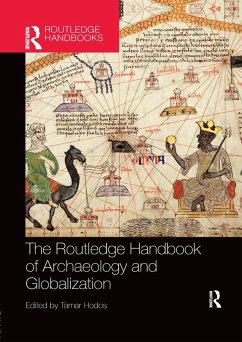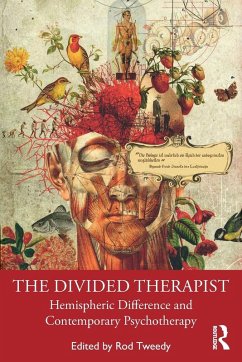
The Global Origins of Psychology
Neurology, Language and Culture in the Ancient World
Versandkostenfrei!
Versandfertig in 6-10 Tagen
41,99 €
inkl. MwSt.
Weitere Ausgaben:

PAYBACK Punkte
21 °P sammeln!
This book offers a historical introduction to the remote origins of psychology, and is the first book in a series on the history of the subject. Combining a deep history approach with the study of ancient civilisations, it places psychology in a historical and global context using rigorous academic research.This book begins by separating the Greek components of psychology - psyche and logos - in order to trace their histories, separate and together, through the global Neolithic and Bronze Ages. The author develops a toolkit by deconstructing the writing of history, modern psychology, and analy...
This book offers a historical introduction to the remote origins of psychology, and is the first book in a series on the history of the subject. Combining a deep history approach with the study of ancient civilisations, it places psychology in a historical and global context using rigorous academic research.
This book begins by separating the Greek components of psychology - psyche and logos - in order to trace their histories, separate and together, through the global Neolithic and Bronze Ages. The author develops a toolkit by deconstructing the writing of history, modern psychology, and analysis of culture, and by introducing theories from neuroscience and cultural psychology that can be tested against the data. He then takes readers on a journey back in time, from the borders of our current climatic envelope (the Holocene) towards the present, through Ancient Iraq, Egypt, Israel, and China. Each chapter deepens the reader's understanding of psychology in its global context outside the boundaries of Western culture. In so doing, the book initiates a post-colonial re-narration showing that the story of psychology is wider and deeper than many contemporary origin stories suggest.
Presented in an accessible manner, this is an excellent resource for students of psychology, philosophy, history, linguistics, archaeology, and anthropology, as well as general readers who want to learn more about the origins of this fascinating subject.
This title precedes Shamanism and Psychology in Ancient Greece and India: The Evolution of Psyche, which applies the same framework to the Indo-European world.
This book begins by separating the Greek components of psychology - psyche and logos - in order to trace their histories, separate and together, through the global Neolithic and Bronze Ages. The author develops a toolkit by deconstructing the writing of history, modern psychology, and analysis of culture, and by introducing theories from neuroscience and cultural psychology that can be tested against the data. He then takes readers on a journey back in time, from the borders of our current climatic envelope (the Holocene) towards the present, through Ancient Iraq, Egypt, Israel, and China. Each chapter deepens the reader's understanding of psychology in its global context outside the boundaries of Western culture. In so doing, the book initiates a post-colonial re-narration showing that the story of psychology is wider and deeper than many contemporary origin stories suggest.
Presented in an accessible manner, this is an excellent resource for students of psychology, philosophy, history, linguistics, archaeology, and anthropology, as well as general readers who want to learn more about the origins of this fascinating subject.
This title precedes Shamanism and Psychology in Ancient Greece and India: The Evolution of Psyche, which applies the same framework to the Indo-European world.














